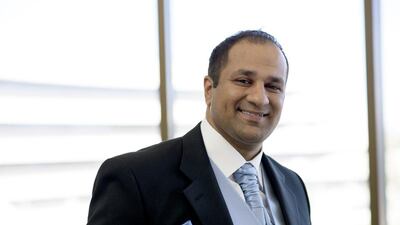Your story about Com Mirza (Dubai businessman campaigns to feed thousands around the world during Ramadan, July 8) was extremely heartening to read.
Despite being from a poor family, he has managed to reach this far through his own efforts and hard work. His campaign to feed tens of thousands of less-fortunate people across the globe is commendable.
He is an inspiration to everyone. There can never be a better and more rewarding act of kindness than feeding hungry mouths during the holy month.His campaign is the ideal way of giving back to the community.
Fatima Suhail, Sharjah
Perhaps this is a publicity stunt but whether it is or it isn’t, some people were made happy this week and that is what counts.
Karl Pais, Abu Dhabi
Those who question his motives should ask themselves whether it would be better to do nothing.
I think there are far too many cynics and not enough people like Com Mirza in the world.
James Magee, Dubai
Crowdfunding is a good thing to do but it can also be a bit dicey. How do we know this person is going to use every penny he receives this way to feed less fortunate people?
Ramadan is almost over – when is he planning to use the money he receives from kind donors?
Brigitte von Bulow, Abu Dhabi
Filipinos need to put money away
After reading your article about people like me being told to start saving (Filipino UAE expatriates struggling to pay for social security scheme, July 7), I think the Social Security System (SSS) should take a bigger role in this life-changing movement and put extra effort into reaching Filipino expats to ensure they are aware of the benefits of the pension programme.
All Filipinos working overseas have a common goal – to provide for their families back home – so I disagree with the claim that Filipinos are not thinking about saving for their future.
Based on my observations and personal experience, most of us want to keep aside at least Dh100 but sometimes we fail to balance our wants and needs so we fall short.
I think most Filipinos need assistance in setting long term goals. We need to know far more about the SSS, its long-term benefits, how to access the programme and so on.
I strongly believe that with better marketing of the SSS, this common goal can be achieved and no Filipino will be faced with returing home to an unsettled future.
Karlyn Salvacion, Abu Dhabi
Cheap smoking has a high price
In relation to your story, Cheap cigarettes in UAE bring a high cost to health, doctor says (July 8), I wouldn't expect anything to change because the UAE already has 24-hour shisha places.
At least they’re closed off. There are no such places for cigarette smokers so people smoke right near building entrances where their second-hand smoke is walked through by non-smokers and parents with infants, young children and toddlers.
Muzammil Sk, Ajman
I think that there should be a rule worldwide where if you are a long-term smoker and get lung cancer then your hospital bills should not be paid by your health insurance or by government health funds.
I know it sounds terribly hard but how else can we stop smokers? They are causing so much illness – to themselves but also to innocent bystanders, family members, office colleagues etc.
Name withheld by request
Water is the real fuel of the future
Reading your article, Platinum hopes for a catalyst as electric cars start to take charge (June 3), makes me think that water is going to be the fuel of the future.
Future cars will split water into pure oxygen and hydrogen – perfect for fuel cell powered cars because the gases are pure and the hydrogen is not contaminated with carbon monoxide, making it cost effective.
Name withheld by request
Early pay day is a cause for restraint
In relation to your story about the six weeks until the next pay day, UAE employees urged to spend their early Eid wages wisely (July 8), although we all make mistakes, I think common sense is something that should be exercised all year round, not just during and after Ramadan.
Neil Phillipson, Al Ain

